Influence of the far-right may be reduced in bilateral relations under Japan’s new PM
Influence of the far-right may be reduced in bilateral relations under Japan’s new PM
Posted September. 15, 2020 07:33,
Updated September. 15, 2020 07:33

“There may be momentum in improving the South Korea-Japan relations under the new administration led by Yoshihide Suga,” said Takeo Kawamura, the secretary general of the Japan-Korea Parliamentarians’ Union and a representative pro-South Korea figure in the Japanese political circles.
Kawamura who is a prominent figure in the faction of Secretary General Toshihiro Nikai has been serving as the pipeline between South Korea and Japan by directly reporting to former Prime Minister Shinzo Abe on issues surrounding South Korea and Japan. “The high likelihood of Nikai remaining in the office who emphasizes the importance of relations with South Korea is a positive sign,” said Kawamura to the Dong-A Ilbo at the House of Representatives hall. He emphasized that new developments in the issue of compensation for forced labor by Japan are needed for better relations between the two countries.
―How will the Suga administration deal with the South Korea-Japan relations?
“The South Korea-Japan relations is a matter to be resolved by any prime minister. Once appointed as the prime minister, Suga will make significant efforts to improve the relations.”
―Some say that the influence of former Prime Minister Abe will continue.
“Diplomatic issues may be discussed with Prime Minister Abe. However, (diplomatic policies toward South Korea) will not be the same considering who will be appointed as the next Chief Cabinet Secretary and the stance of the foreign minister. It will become much easier for us (Cabinet members pursuing the improvement of the bilateral relations) to take various actions to improve the relations.”
―What’s the biggest difference between the Suga administration and the Abe administration?
“Former Prime Minister Abe was in the environment that can be easily influenced by Nippon Kaigi (Japan’s largest far-right organization), and other (conservative) figures. It is true that Abe was surrounded by perhaps not anti-South Korea but similar influences of the figures. However, the Suga administration will be different.”
―Chief Cabinet Secretary Suga has been known to have a very firm stance towards South Korea.
“As he has served as the chief Cabinet secretary for seven years and eight months under the Abe administration, he must have been quite exposed to its influence. There won’t be any change in terms of the forced labor and export control issues for a while as he succeeds to the Abe administration. However, there can be several solutions, such as restoring South Korea on the whitelist (of favored trading partners). Once appointed, (Chief Cabinet Secretary Suga) will gather information on this issue and make decisions.”
―Suga has repeatedly mentioned retaliatory actions regarding the issue of forced labor.
“The new administration is different from Abe’s. It will respond based on the analysis of multiple aspects, such as whether South Korea allows liquidation regarding the forced labor issue and future developments in South Korea’s WTO dispute settlement proceedings over Japan's export controls.”
―Will a summit meeting between the two countries be held?
“It will be held if new solutions are proposed regarding the forced labor issue and it is to be resolved at a summit. If there is no development for resolution, only an inaugural remark will be made.”
bsism@donga.com
Headline News
- N. Korea launches cyberattacks on S. Korea's defense companies
- Major university hospital professors consider a day off each week
- Italy suffers from fiscal deficits from ‘Super Bonus’ scheme
- Inter Milan secures 20th Serie A title, surpassing AC Milan
- Ruling and opposition prioritize spending amid tax revenue shortfalls







